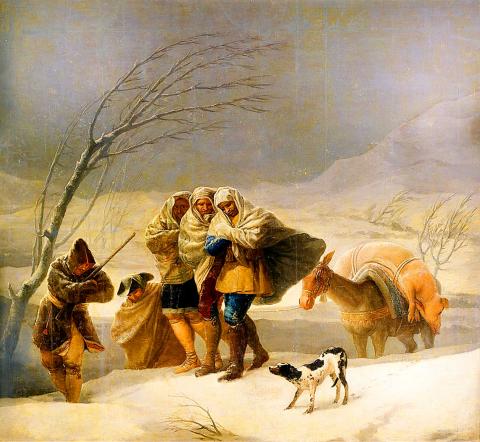Chinese practice
雪中送炭
to send charcoal in snowy weather

Photo: Wikimedia Commons
照片:維基共享資源
(xue3 zhong1 song4 tan4)
南宋詩人范成大(西元一一二六~一一九三)曾作一詩《大雪送炭與芥隱》,描述他在大雪中帶著木炭送去給朋友,因為擔心朋友家裡沒柴火可以取暖。但他又怕朋友覺得受接濟而難為情,便跟朋友說,拿木炭去不過是訪友的藉口,他真正的目的是要請朋友為他作一首詩。
范成大送炭的典故來自時間早他兩世紀的北宋太宗(西元九三九~九九七)的軼事。宋太宗在位晚年,有一段時間天氣特別寒冷,大雪不斷,太宗便命屬下分送木炭等物資給民眾,避免他們凍死。成語「雪中送炭」(原作「雪裡送炭」)便是出自這充滿愛心的故事,字面意義為在下雪的天氣中送出木炭,引申為在別人最需要時提供援助。
在英文中,有兩種說法可以表達「雪中送炭」的意思,一為to send help in somebody’s hour of need(在某人需要的時刻提供幫助),另一為「to send in the cavalry」(派騎兵來)。
騎兵隊是騎馬的兵團,因而是軍中行動最迅捷的單位,需要時可以支援到很遠的地方。當我們說「it’s time to call in the cavalry」(該找騎兵了),意思是說我們需要強有力的盟友趕快來幫忙。
(台北時報編譯林俐凱譯)
年關將近,善心人士捐贈大筆物資給育幼院童,這真是雪中送炭啊!
(The year is coming to an end, and compassionate people are donating piles of gifts to orphanages, it’s like a blessing from Heaven for the kids.)
雪中送炭的人才是真朋友。在你風光時想跟你攀關係的多是酒肉朋友。
(Your real friends are those willing to help in your hour of need. Those trying to hitch a ride when you’re doing well for yourself are nothing but fair weather friends.)
英文練習
in your hour of need
send in the cavalry
The Southern Song dynasty poet Fan Chengda (1126AD to 1193AD) wrote a poem entitled “Offering charcoal to Jie Yin in heavy snow.” In the poem, Fan talks of how, during a period of heavy snow, he goes to the house of a friend with a gift of coals, concerned his friend would have nothing to heat his house with. Perhaps worried that the friend might feel embarrassed at his act of charity, Fan tells him that the charcoals were merely a pretext for his visit, and that his true purpose was to have him compose a poem for him.
Fan’s offering of coals is a reference to an anecdote dating to the Northern Song period two centuries previously. The story goes that, toward the end of his reign, during a particularly long cold spell with days of continuous snowfall, Emperor Taizong (939AD to 997AD) had his officials distribute coals so that people would not perish from the cold. From this story of compassion came the idiom 雪中送炭, originally written 雪裡送炭, literally meaning “to send charcoal in snowy weather” and, by extension, offering help at times it is most needed.
In English, there are two ways to describe the idea of sending help at a crucial time. The first is to send help in somebody’s hour of need. The second is “to send in the cavalry.”
The cavalry is a regiment of soldiers mounted on horseback, and therefore the most mobile unit in the army, who could quickly cover great distances when required to. When we say “it’s time to call in the cavalry,” we mean we need help from a powerful or capable ally, and quickly.
(Paul Cooper, Taipei Times)
Quick. Call in the Cavalry. See if Andy is answering his phone.
(快!快找救兵!看安迪會不會接電話。)
I can always rely on Kate to help me in my hour of need.
(在我最需要的時候,凱特總會幫我。)

In an effort to fight phone scams, British mobile phone company O2 has introduced Daisy, an AI designed to engage phone con artists in time-wasting conversations. Daisy is portrayed as a kindly British granny, exploiting scammers’ tendency to target the elderly. Her voice, based on a real grandmother’s for authenticity, adds to her credibility in the role. “O2” has distributed several dedicated phone numbers online to direct scammers to Daisy instead of actual customers. When Daisy receives a call, she translates the scammers’ spoken words into text and then responds to them accordingly through a text-to-speech system. Remarkably, Daisy

Bilingual Story is a fictionalized account. 雙語故事部分內容純屬虛構。 Emma had reviewed 41 resumes that morning. While the ATS screened out 288 unqualified, she screened for AI slop. She could spot it a mile away. She muttered AI buzzwords like curses under her breath. “Team player.” “Results-driven.” “Stakeholder alignment.” “Leveraging core competencies.” Each resume reeked of AI modeling: a cemetery of cliches, tombstones of personality. AI wasn’t just changing hiring. It was draining the humanity from it. Then she found it: a plain PDF cover letter. No template. No design flourishes. The first line read: “I once tried to automate my

Every May 1, Hawaii comes alive with Lei Day, a festival celebrating the rich culture and spirit of the islands. Initiated in 1927 by the poet Don Blanding, Lei Day began as a tribute to the Hawaiian custom of making and wearing leis. The idea was quickly adopted and officially recognized as a holiday in 1929, and leis have since become a symbol of local pride and cultural preservation. In Hawaiian culture, leis are more than decorative garlands made from flowers, shells or feathers. For Hawaiians, giving a lei is as natural as saying “aloha.” It shows love and

1. 他走出門,左右看一下,就過了馬路。 ˇ He walked outside, looked left and right, and crossed the road. χ He walked outside and looked left and right, crossed the road. 註︰並列連接詞 and 在這句中連接三個述語。一般的結構是 x, y, and z。x and y and z 是加強語氣的結構,x and y, z 則不可以。 2. 他們知道自己的弱點以及如何趕上其他競爭者。 ˇ They saw where their weak points lay and how they could catch up with the other competitors. χ They saw where their weak points lay and how to catch up with the other competitors. 註:and 一般連接同等成分,結構相等的單詞、片語或子句。誤句中 and 的前面是子句,後面是不定詞片語,不能用 and 連接,必須把不定詞片語改為子句,and 前後的結構才相等。 3. 她坐上計程車,直接到機場。 ˇ She took a cab, which took her straight to the airport. ˇ She took a cab and it took her straight